 the libvirt project is already available under the *libvirt* ProjectID; this one (libv*e*rt) is a duplicate! Please delete me.
the libvirt project is already available under the *libvirt* ProjectID; this one (libv*e*rt) is a duplicate! Please delete me.
 The libvirt project: is a toolkit to manage virtualization platforms is accessible from C, Python, Perl, Go and more is licensed under open source licenses supports KVM, Hypervisor.framework, QEMU, Xen, Virtuozzo, VMWare ESX, LXC, BHyve and more targets Linux, FreeBSD, Windows and macOS is used by many applications
The libvirt project: is a toolkit to manage virtualization platforms is accessible from C, Python, Perl, Go and more is licensed under open source licenses supports KVM, Hypervisor.framework, QEMU, Xen, Virtuozzo, VMWare ESX, LXC, BHyve and more targets Linux, FreeBSD, Windows and macOS is used by many applications
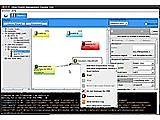 LCMC is a GUI for managing server clusters based on Pacemaker, Corosync, Heartbeat, DRBD, KVM, XEN and LVM. Server management is implemented in Perl, while the management console is Java-based.
LCMC is a GUI for managing server clusters based on Pacemaker, Corosync, Heartbeat, DRBD, KVM, XEN and LVM. Server management is implemented in Perl, while the management console is Java-based.
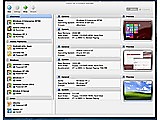 VirtualBox is a full x86 hardware virtualizer, suitable for server, desktop and embedded usage. It's extremely feature-rich, emulates lots of individual and alternative hardware and devices, supports different virtual machine disk formats, it's cross-platform and supports ancient and current Windows versions, DOS systems, BSD, Solaris and OS/2 as guest operating system.
VirtualBox is a full x86 hardware virtualizer, suitable for server, desktop and embedded usage. It's extremely feature-rich, emulates lots of individual and alternative hardware and devices, supports different virtual machine disk formats, it's cross-platform and supports ancient and current Windows versions, DOS systems, BSD, Solaris and OS/2 as guest operating system.
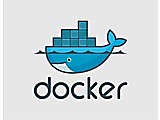 Docker is an open platform for distributing software application in containers. It utilizes operating system-level virtualization for process and full resource isolation through cgroups, capabilities, SELinux, AppArmor, netfilter, and Linux kernel namespaces. Its libcontainer is based on libvirt and lxc. Docker Engine is the application and environment packaging tool. And Docker Hub is a cloud service for sharing prepackaged containers.
Docker is an open platform for distributing software application in containers. It utilizes operating system-level virtualization for process and full resource isolation through cgroups, capabilities, SELinux, AppArmor, netfilter, and Linux kernel namespaces. Its libcontainer is based on libvirt and lxc. Docker Engine is the application and environment packaging tool. And Docker Hub is a cloud service for sharing prepackaged containers.
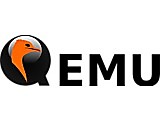 QEMU is a generic machine emulator and virtualizer. It can emulate other CPU and host architectures, or run native binaries with native performances by executing the guest code directly on the host CPU any only emulate devices. It's thus often used in conjunction with KVM on Linux for system virtualization.
QEMU is a generic machine emulator and virtualizer. It can emulate other CPU and host architectures, or run native binaries with native performances by executing the guest code directly on the host CPU any only emulate devices. It's thus often used in conjunction with KVM on Linux for system virtualization.
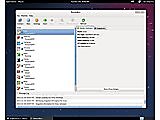 RemoteBox is a client for administring guest VMs on a VirtualBox server. It provides a complete GTK interface similar to VirtualBox itself, and allows direct interaction (RDP) with the running system from a remote "client" machine. All system / virtualization properties can be influenced, devices edited, networking setup changed, and VM snapshots be made.
RemoteBox is a client for administring guest VMs on a VirtualBox server. It provides a complete GTK interface similar to VirtualBox itself, and allows direct interaction (RDP) with the running system from a remote "client" machine. All system / virtualization properties can be influenced, devices edited, networking setup changed, and VM snapshots be made.
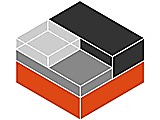 LXC (Linux Containers) is a distribution and management-neutral container technology for virtualization at the operating-system level. LXC is the low-level basis, provides language bindings, and widely supported tools. The stack utilizes kernel namespace isolation and cgroups to provide OS views with self-contained process trees, network settings, filesystems and distinct user ids. It's used similarly to OpenVZ or Linux-vServers, even can be used as execution driver within Docker; but requires n
LXC (Linux Containers) is a distribution and management-neutral container technology for virtualization at the operating-system level. LXC is the low-level basis, provides language bindings, and widely supported tools. The stack utilizes kernel namespace isolation and cgroups to provide OS views with self-contained process trees, network settings, filesystems and distinct user ids. It's used similarly to OpenVZ or Linux-vServers, even can be used as execution driver within Docker; but requires n
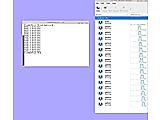 LXC Facility (LXCF) can generate full operating system containers to be used as LXC virtual environment. It's based on libvirt-lxc, a console is available through virt-manager, can build containers in just a few minutes, manage multiple of them, allows dynamic resource control, and reuse available host applications. LXCF already supports Ubuntu 14.04/14.10, Fedora 19/20, and CentOS/RHEL 7.
LXC Facility (LXCF) can generate full operating system containers to be used as LXC virtual environment. It's based on libvirt-lxc, a console is available through virt-manager, can build containers in just a few minutes, manage multiple of them, allows dynamic resource control, and reuse available host applications. LXCF already supports Ubuntu 14.04/14.10, Fedora 19/20, and CentOS/RHEL 7.
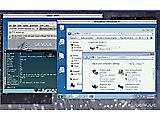 The Genode operating-system framework provides a unified application interface over different microkernel and hypervisor systems. It's a slim references implementations that runs atop Linux, L4ka::Pistachio, L4/Fiasco, OKL4, NOVA, Fiasco.OC, Codezero, and a custom kernel for ARM SoCs. Genode is designed for dynamic workload distribution while separating operation priviliges for rubustness.
The Genode operating-system framework provides a unified application interface over different microkernel and hypervisor systems. It's a slim references implementations that runs atop Linux, L4ka::Pistachio, L4/Fiasco, OKL4, NOVA, Fiasco.OC, Codezero, and a custom kernel for ARM SoCs. Genode is designed for dynamic workload distribution while separating operation priviliges for rubustness.
|